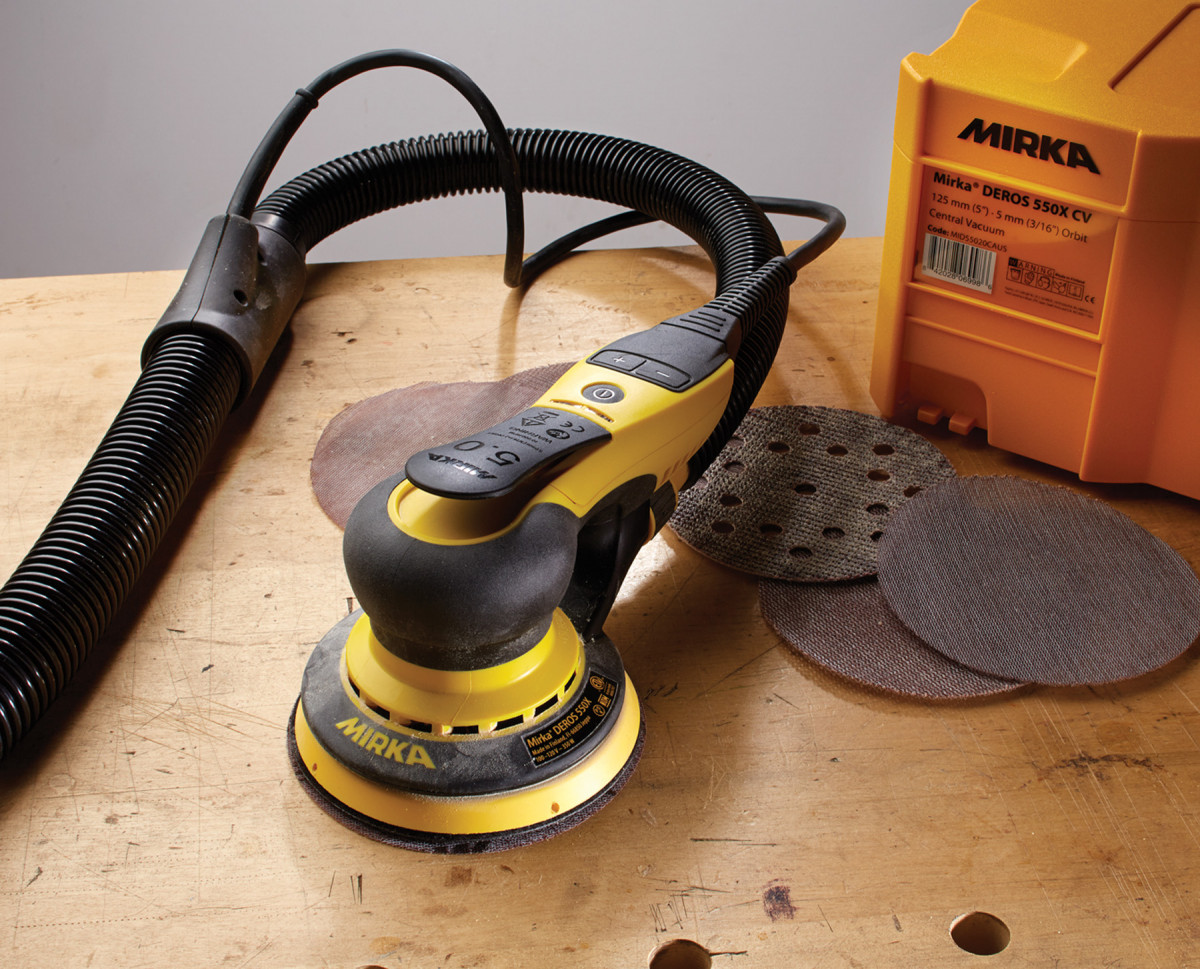We may receive a commission when you use our affiliate links. However, this does not impact our recommendations.

Fast & clean. The Mirka DEROS sander performs like an air-powered tool – and the dust collection is amazing. The damp paper towel at right contains all the residual dust wiped from a 9′ butcher-block counter after sanding.
Tool: DEROS
Manufacturer: Mirka
MSRP: $625
Editor’s note: This review originally appeared in the April 2015 issue of Popular Woodworking. The tool is still available and just as great as ever though.
I avoid sanding as much as possible – but sometimes it has to be done. Since early 2010, when we got a Mirka CEROS (Compact Electrical Random Orbital Sander) in for pre-release testing, that’s been my go-to tool for this dreaded task.
What I’ve never liked about the CEROS, however, is that it plugs into an external power pack that then plugs into the wall. Yes, the sander outperforms other electric sanders (it looks, feels and performs like an air-powered unit), but coupled with the power pack for which you have to allow room, it’s far more cumbersome to move around, there are several connections to check, and it takes more space to store. And it’s a bit inconvenient to pack up and transport.
Mirka’s new 5″ DEROS (Direct Electric Random Orbit Sander), though…I’m wholly impressed. This 4,000-10,000 rpm variable-speed tool replicates all that’s praiseworthy about the CEROS, but it plugs directly into a typical household wall outlet. No more external power pack. Plus, the power cord is integrated into the 18′ dust-collection hose (a 30′ hose is also available), so it never gets in the way.
At just 2.3 pounds on our postal scale, the DEROS weighs less than the Ridgid R2601 electric random-orbit sander (ROS) I bought for use at home (3.4 pounds).
In December, I sanded my butcher-block countertops and leveled the walls and ceiling of a room that formerly featured faux Venetian plaster. On two walls and half a ceiling, and on one counter, I used my Ridgid; for the second room and other counter, I used the DEROS. Less weight, coupled with better balance and control because your hand is much closer to the work, makes a huge difference – particularly when sanding overhead and on vertical surfaces (I had a lot of both on the walls).
The tool’s height is 33⁄4“; Porter-Cable’s 390K low-profile ROS is 43⁄8” in height, which is already 1″ or so shorter than other ROS models). And the on/off – the paddle on top – is a lot more convenient than the typical side-mounted switch.
The dust collection difference between the two, both hooked up to the same Festool CT mini vacuum, and with the same sanding discs (Abranet), was also noticeable; I had far less cleanup on both wood and plaster with the DEROS.
It’s also quiet; I didn’t have a decibel meter handy at home, but it passed the “cat test” – they didn’t run. (The company’s literature states the dBs as 71.)
The one sticking point is the price; at around $600, this sander is significantly spendier than other consumer electric sanders. But the technology and performance are also significantly better. So while I’m not ready to say goodbye to my Ridgid (I can’t bear to bin an adequate tool, particularly one I don’t use often), when the time comes for a replacement, I will shell out the extra dough for better performance, better dust collection and ease of use. There is likely a lot more plaster work in my future when I find a new old house to rehab, so it will be worth it.
Here are some supplies and tools we find essential in our everyday work around the shop. We may receive a commission from sales referred by our links; however, we have carefully selected these products for their usefulness and quality.






![Tooley Park Scriber Review [Discount Week of Feb 3 2025]](https://dev.popularwoodworking.com/wp-content/uploads/bfi_thumb/dummy-transparent-olcy6s63it1p9yp7uhusjas7c8kahafrhg9su7q9i0.png)

